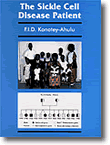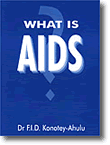Author : Biography
Felix Konotey-Ahulu FGA MB BS(Lond) MD(Lond) FRCP(Lond) FRCP(Glasg) DSc(UCC) FGCP FTWAS FWACP DTMH(L’pool) - Kwegyir Aggrey Distinguished Professor of Human Genetics University of Cape Coast, Ghana and Consultant Physician Genetic Counsellor in Sickle Cell and Other Haemoglobinopathies, 9 Harley Street Ltd, Phoenix Hospital Group, London W1G 9AL
I first began investigating the Sickle Cell disease Clinical Haemoglobinopathy Patients while working at the Korle Bu Teaching Hospital and University of Ghana Medical School in Accra, directing the largest Sickle Cell Clinic in the world. The fact that I was born into a home of 11 children 3 of whom suffered from Sickle Cell Disease taught me a lot about this hereditary cold season rheumatism malady even before I went to London University’s Westminster Hospital School of Medicine to become a doctor, qualifying LRCP MRCS (England) and MB BS (London) in 1959. I proceeded to obtain my Doctorate in Medicine (MD London University) as a result of the work I did at the Sickle Cell Clinic in Ghana, making several discoveries and winning national and international awards.
When the AIDS pandemic broke I toured African countries to find out what was happening at the grass roots, and I published my findings in a book “WHAT IS AIDS?” My other research interests have been in Tonal Linguistics where I also made discoveries like the ‘Mid Pitch Arrest’ and ‘Lower Mid Pitch Arrest’ in Krobo/Dãngme-Gã which had never before been described in any Linguistics textbook [See http://bit/ly/bEdcc4]
The reason my sickle cell website attracts much attention (156,488 hits in March 2013) is my claim that “The Patient” is more important than “The Disease”, as I once illustrated in The Lancet (2005, Volume 365, pages 382-383): One 5 year old sickle cell anaemia (‘SS’) twin developed a stroke, while the other did not, and I explained why. My 643-page book “The Sickle Cell Disease Patient” was described by Professor Geraint James MA MD FRCP as follows: “This thesaurus or treasure trove of information adds a new dimension to the world of sickle cell disease”. Professor Helen Ranney MD of Albert Einstein College of Medicine, New York, said: “There is no single clinical experience in the United States comparable to that of Dr Konotey-Ahulu”. See other comments [What people say] in www.sicklecell.md especially by Howard University’s Professor Roland Scott MD, and by others like London University’s Professor Alastair J Bellingham MD FRCP FRCPath, OxfordUniversity’s Professor Sir David Weatherall FRS MD FRCP FRCPath, and University of Utah’s Distinguished Professor Dr Maxwell Wintrobe MD. The concluding paragraph of the Foreword to my book by Professor Roland Scott is this: “Serious students of the haemoglobinopathies will be intrigued by the inclusion of abstracts on the clinical histories of 133 case reports and the listing of over 4000 references from the world literature. This book is a meritorious addition to the medical literature and Dr Konotey-Ahulu is revealed as a seductive narrator as he tells the story of the sickle cell disease patient”.[Page ix].
I have since simplified the concept of the sickle cell disease phenotype by using the term ‘ACHEACHE’ implying that only when both father and mother pass on their ‘ACHE’ genes to the same child does the hereditary ailment (which has had tribal names for centuries) manifest itself. I try to use Facebook to educate Ghanaians especially, and the world in general, that 1 in 3 of us Ghanaians carry one ACHE gene making us NORMACHE. Sperm carries just one of the double genes ‘NORM’ or ‘ACHE’, never both. Similarly the egg of a NORMACHE female like my own mother would carry the code ‘NORM’ or ‘ACHE’, never both. Depending on which sperm met which egg to produce a baby, my parents’ 11 children shared the phenotypes ‘NORMACHE’ (4 of us), NORMNORM (4 of us), and the 3 of us who had hereditary cold season rheumatism were ACHEACHE. If my Facebook does little else than pass on this message to every single reader I would be enormously satisfied, for that was exactly what my KÁGÈ SICKLECELL FOUNDATION was set up to do [‘KÁGÈ’ stands for ‘Konotey-Ahulu Genetic Epidemiology’]
The ACHEACHE hereditary malady [called hemkɔm (body biting) in my Krobo/Dãngme Mother Tongue or chwechweechwe in Gã, ahotuto (Twi), Nuidudui (Ewe), dobakɔtiri (Dagbãni), nwiiwii (Fante), aromolegun or lakuregbee (Yoruba)] – this hereditary cold season malady was traced in my own family generation by generation backwards to 1670 AD with names of sufferers – the first time this has been done in Clinical Medicine by anybody for any hereditary disease [See http://www.sicklecell.md/images/generation.jpg and see how polygamy in my forebears enabled me to trace inheritance [Also http://www.konotey-ahulu.com/images/generation.jpg]. To understand how an African can trace a disease generation by generation backwards over 3 Centuries, see Chapter 2, pages 6 to 20 of my “The Sickle Cell Disease Patient”. Researchers who want published references in international journals will find information in my list of Publications from 1965 year by year till 2013 – upwards of 350 major and minor publications.
AWARDS:
(i) Dr Martin Luther King Jr Foundation Award for outstanding contribution to Sickle Cell Research 1972, Philadelphia
(ii) Ghana Academy of Sciences Gold Medal 1974, Accra
(iii) Guinness Award for Scientific Achievement in the Commonwealth 1976, London
(iv) Third World Academy of Sciences Award for Scientific Achievement 1998, Dakar
(v) African American Museum of Philadelphia (AAMP) Humanitarian Award 2007, Philadelphia
(vi) Klo Hingme – ‘The Eye of Krobo’, Title given by Konor of Manya Krobo Nene Sakite II after the 10th Dr Ephraim Amu Lecture on Tonal Linguistics at British Council 2007, Accra
(vii) Ghana Government ORDER OF THE VOLTA 2008, Accra
(viii) SICKLE CELL PIONEER SCIENTIST AWARD 2010 at First Global Congress on Sickle Cell Disease, Accra
(ix) Academy of The Developing World Award for Public Understanding and Popularization of Science 2010, Hyderabad
(x) Guest of Honour Westminster Hospital School of Medicine 1959 Graduates Alumni Dinner/Lecture 2012 at Athenaeum, London.
1965 to present day, click here


449Konotey-Ahulu FID. ANNOUNCEMENT OF THE PASSING OF PROFESSOR FELIX KONOTEY-AHULU MD FRCP MAY 2025
2025 | More
2025 | More
Donations
If this website has been of help to you, feel free to make a donation to enable us investigate enquirers who wish to know whether they are carrying an ACHE gene or not, and thus help them make decisions that will prevent the burden of this hereditary ACHEACHE ailment of Sickle Cell Disease and other Haemoglobinopathy.
FAQs (Click here for more)




1. Why is Sickle Cell Anaemia only found in Black people?
This is a very common mis-conception. Sickle cell anaemia (sca) is not "only found in Black people". White people in Greece, Sicily, Turkey, and their offspring around the world suffer from sickle cell anaemia (sca)... | More
This is a very common mis-conception. Sickle cell anaemia (sca) is not "only found in Black people". White people in Greece, Sicily, Turkey, and their offspring around the world suffer from sickle cell anaemia (sca)... | More

2. Why do people with sickle cell anaemia not suffer from malaria?
A common mis-conception. A dangerous misconception. People with sickle cell anaemia do suffer from malaria, and very badly too. Doctors who have been wrongly taught have been known to advise... | More
A common mis-conception. A dangerous misconception. People with sickle cell anaemia do suffer from malaria, and very badly too. Doctors who have been wrongly taught have been known to advise... | More

3. Why then do Science teachers always talk about malaria protection in sickle cell anaemia?
Inadequate knowledge, or plain ignorance is the simple answer. I repeat: malaria affects sickle cell anaemia patients more seriously than it does others.... | More
Inadequate knowledge, or plain ignorance is the simple answer. I repeat: malaria affects sickle cell anaemia patients more seriously than it does others.... | More

SITE MAP
If this website has been of help to you, feel free to make a donation to enable us investigate enquirers who wish to know whether they are carrying an ACHE gene or not, and thus help them make decisions that will prevent the burden of this hereditary ACHEACHE ailment of Sickle Cell Disease and other Haemoglobinopathy.
BOOKMARK / SHARE
© 2000 - 2026 Konotey-Ahulu | Privacy Policy | Website designed & developed by Chaplin Multimedia Ltd.

